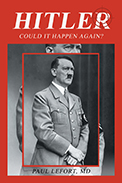
 |
Dr. Lefort’s text approaches Hitler from an incredibly unique angle. Rather than presenting Hitler’s already well-documented history, Lefort focuses on understanding Hitler’s life from a comprehensive perspective to identify catalysts that transformed an art aficionado into one who believed his divine mission involved “exterminating” the Jewish population. From Hitler’s family history to how he recoiled from life after his mother’s death, Hitler’s multitude of layers and dichotomies are depicted with extreme clarity. For instance, Hitler was known for being shy and reserved; however, he is also recognized for being one of history’s most potent orators. Even his ardent nationalistic tendencies are doused in irony as he could not even claim Germany as his motherland, his own country.
With references to Mein Kampf (where he noted the necessity to “eradicate France” for German expansion), the Treaty of Versailles, Die Weisse Rose, and the Nuremberg Trials, Dr. Lefort paints a complete historical picture to provide context to the ramifications of Hitler’s rise. There are numerous intriguing points, but perhaps none more than Hitler’s unyielding belief that only one man should have all the decision-making power and his hypersensitivity to any negative talk against Germany, particularly from the press. Throughout the text, timely placement of tables, particularly those showing casualty numbers from World War II and “The ingredients of Hitler’s power” show the enormity of destruction and help the audience fully digest the chaos. Holistically, Dr. Lefort dedicates the book to analyzing what made Hitler tick, whether Hitler was mentally ill, and learning lessons to prevent a future Hitler from coming to power. Ultimately, what makes Dr. Lefort’s text a meaningful read and sets it apart from the many biographies on Hitler is its focus on questions like why it happened and how can we recognize the signs before it happens again.
RECOMMENDED by the US Review